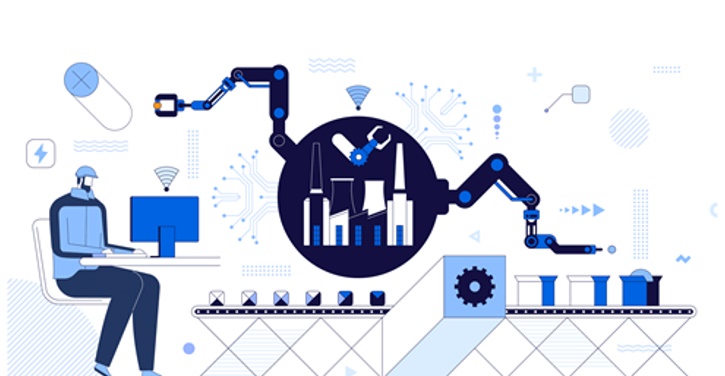Table Of Contents
| Sr. No. | Title |
| 1 | Introduction |
| 2 | The Role of Artificial Intelligence (AI) |
| 3 | AI Technologies in Market Research |
| 4 | Applications of AI in Market Research |
| 5 | Benefits of AI in Market Research |
| 6 | Challenges of AI in Market Research |
| 7 | Why AI alone is not enough? |
| 8 | Future Prospects of AI in Market Research |
| 9 | References |
1. Introduction:
Market research plays a important role in decision-making for businesses. It involves collecting, analysing and interpreting data about a market, including information about the target audience, competitors, and industry.
Market research industry is undergoing a significant transformation due to rapid growth in technology.
2. The Role of Artificial Intelligence (AI):
AI refers to human intelligence replicated in machines programmed to think and learn like humans. It includes capabilities such as natural language processing (NLP), machine learning (ML), computer vision and robotics. In market research, AI is used to automate different processes from data collection to report generation.
AI technology can take over the tedious, manual processes like cleaning unstructured data, inputting data sources into charts, automating statistical analyses, and creating final reports.
Integrating AI increases productivity, accuracy, and can provide better insights at lesser time. AI tools can process large amounts of dataset at fast speeds, it can identify complex patterns, features, and provide valuable insight.
It is also used for predictive analytics, sentiment analysis, and real-time data analysis. Many market research providers use AI for efficient data cleaning, predictive insights, text and data analysis, and more.
3. AI Technologies in Market Research
- Natural Language Processing (NLP): AI that focuses on communication between computers and humans through natural language. In market research, it can be used to analyse data (customer reviews, social media posts, survey responses). By understanding the context and emotions behind these texts it can determine whether customer feedback is positive, negative, or neutral. It can identify key topics or topics covered in large text data sets, it can summarize long sections of material into short ones and highlight important.
Key industries where natural language process market research is making a significant impact:
- Healthcare (Philips, GE Healthcare) analysing clinical notes and patient records improve patient care and diagnostics. NLP helps in identifying patterns and insights that can aid in diagnosis, treatment plans, and predicting patient outcomes.
- Finance and Banking: for sentiment analysis, risk assessment, and customer service enhancement. NLP enables these firms to analyse market trends, customer feedback, and financial reports, providing a deeper understanding of the market and customer needs.
- Retail and E-commerce: Retail giants like Amazon, Walmart use it to analyse customer reviews, feedback, and social media trends. This analysis help them understand consumer behaviour, product recommendations, and can tailor marketing strategies to meet customer demands.
- Technology and Software: Use it to enhancing search engine algorithms, developing smarter virtual assistants, and improving user experience across their platforms.
- Automotive: Companies like Tesla and BMW are integrating NLP to enhance vehicle technology and customer service. It is is used in developing advanced voice recognition systems for in-car assistance and analysing customer feedback for product improvement.
- Machine Learning (ML): development and study of statistical algorithms that can learn from data and generalize to unseen data and thus perform tasks without explicit instructions [2] ML algorithms can identify patterns and trends in large data sets that would be impossible for humans to detect.
Advantages of Machine Learning
There are many advantages to using machine learning as a research tool. Some advantages include
- User-generated content is virtually free
- Machine learning can draw on comments from thousands of people
- Content contains insights that are freely volunteered at moments of truth
- Machine-based analysis can overcome human bias
- Ability to identify infrequently mentioned and unique insights
Machine learning eliminates data collection process and reduce the time to half to answer the research question.
Traditional qualitative research includes 6 steps and can take more than 6 weeks:
- Develop discussion guide
- Recruit and interview
- Record and transcribe interviews
- Transcript reading
- Refine the database
- Analyse and interpret
Whereas, ML needs 4 steps and the same could be done in 1-2 weeks
- Develop area of inquiry
- Identify user generated to mine
- Train machine and run algorithm
- Analyse the data and interpret.
4. Applications of AI in Market research
- Predictive analytics and modelling: AI analyses past and current data to predict future trends, using algorithms that recognize patterns and predict outcomes.
- Data collection and analysis from multiple sources. It can process data from social media, reviews, forums, and more to provide a comprehensive view of consumer preferences.
- Sentiment analysis: Using NLP it helps to find the emotion and perception of customers.
- In-depth interview analysis. It can process audio and video for in depth analysis using speech recognition and transcript text analysis algorithms. By analysing tone, pace, and speech patterns it can help to understand attitude and perception of participant.
- Behaviour analysis: AI can be used to track browsing and purchase history on e-commerce platform. It can identify buying patterns and decision making processes.
- It can detect trends. AI scan through various data can through various data sources to pinpoint new consumer interests and market shifts. Using data mining techniques, AI analyses patterns over time, flagging emerging trends often missed by traditional methods and human researchers.
- It can be used to analyse competitors’ moves and strategies. AI can compute competitors strategies from diverse data source (new, social media, financial reports)
- It can keep track of market 24/7, which is hard to do manually without a very large team.
- AI can automatically analyse survey results, patterns, trends and give valuable insights
- AI-chatbots are introduced, which can be used to engage users in survey and collect data in a more interactive and user friendly way. It can adapt questions based on responses, enhancing survey relevance and engagement.
- It can help to design surveys which can give better quality of data.
- AI can also be integrated with surveys that will adapt questions in real time according to participants’ behaviour.
5. Benefits of AI in Market Research
- AI can process large amount of data way faster than human and can provide real time analysis and thus faster decision making and saving time.
- AI can run continuously without fatigue as in case of humans, providing continuous data collection and analysis.
- Better accuracy due to no human error in manual data processing and analysis
- Consistent result over dataset using standardised method.
- Better insights since it can identify complex patterns and trend which might not be possible for every researcher.
- Predict future trends with good accuracy based on historical data.
- Automating data analytics will reduce the need for large team.
- It can easily handle large size of data.
- It can give better insights on consumer behaviour and preferences.
- Able to understand sentiment from text helping in sorting of Qualitative data as well.
- It can also give insight on customer interaction and behaviour.
6. Challenges of AI in Market Research
- If good quality data is not provided it can produce wrong insights.
- Due to privacy issues hard to collect data from different sources.
- Requirement of experts to interpret and understand results provided by complex algorithms.
- Requirement of technical experts to implement and maintain AI systems
- Needs high initial investment for software, hardware and training
- Needs regular update and maintenance to be effective.
- Regulations like GDPR raises concerns about data privacy.
- It can inherit biases due to training data which can result in biased results.
- Integrating AI tools in existing IT infrastructure and data system is complex and time-consuming as well.
- Some workers might be worried that AI will take their jobs, or they might not be sure how it all works because of which there is resistance to adoption.
- Over reliance can lead to lack of human insight leading to missed opportunities and overlooked mistakes.
7. Why AI alone is not enough?
- Need of human to human discussion to personalize and understand consumer insight and bring it to life.
- Highly skilled professionals will be required to set up tailored AI integration and solve issues and improve AI features over time.
- Different people are needed to complete a project, even if an all in one platform is used there will still be need of panel partners, software integrations, and other external elements.
- AI can only help in few steps in qualitative and quantitative research projects where researchers gather consumer feedback and act on the insights.
8. Future Prospects of AI in Market Research
- Advanced Predictive Analytics:
Predictive analysis is forecasting predictions based on historical data. Companies use this to forecast trends, consumer behaviour and market fluctuations. Increasing its accuracy will get us closer to what customer will want and will be prepared beforehand with high possibility of success. - Personalised customer experience:
AI will enable more personalised customer experiences. By analysing customer data in real-time, AI can tailor interactions to individual preferences. This personal touch enhances customer satisfaction and loyalty. - Better Sentiment and Emotion Analysis
By understanding customer emotions better strategies can be refined and made more customer-centric. - Seamless Integration with Social Media
Social media is rapidly becoming important platform to gather insights. With AI’s role in social media analysis it will be easier to track real time data and trends.
9. References:
- https://www.sisinternational.com/solutions/ai-market-research-and-strategy-consulting/natural-language-processing-ai-market-research/: Retrieved on 11 July 2024
- https://link.springer.com/book/10.1007/978-94-009-0279-4: 1996: Retrieved on 11 July 2024
- https://info.ams-insights.com/machine-learning-market-research#what_is_machine_learning:Retrieved on 11 July 2024
- https://www.voxpopme.com/market-research-blog/applications-of-ai-in-market-research/ : Retrieved on 12 July 2024
- https://www.voxpopme.com/market-research-blog/applications-of-ai-in-market-research/ : Retrieved on 12 July 2024
- https://quals.ai/market-research/future-of-market-research-how-ai-enhances-qualitative/: Retrieved on 12 July 2024
Disclaimer:
This disclaimer outlines the copyright terms for the Case Study – Use Of AI In Market Research, emphasizing that it is the intellectual property of Maction Consulting Pvt. Ltd. All rights are reserved, including reproduction, distribution, and adaptation, requiring prior written permission. While educational and non-commercial use is permitted with full attribution, any modification or derivative work creation necessitates explicit written consent. The Work is offered as-is for guidance, with no warranties, and the copyright holder disclaims liability for errors or consequences. The right to amend this disclaimer without prior notice is reserved, and unauthorized use may lead to legal action. For inquiries, contact info@maction.com
This Case-Study is researched, designed and managed by Maction Consulting Pvt. Ltd., Ahmedabad, India.
Our LinkedIn Profile : https://in.linkedin.com/company/mactionconsulting





